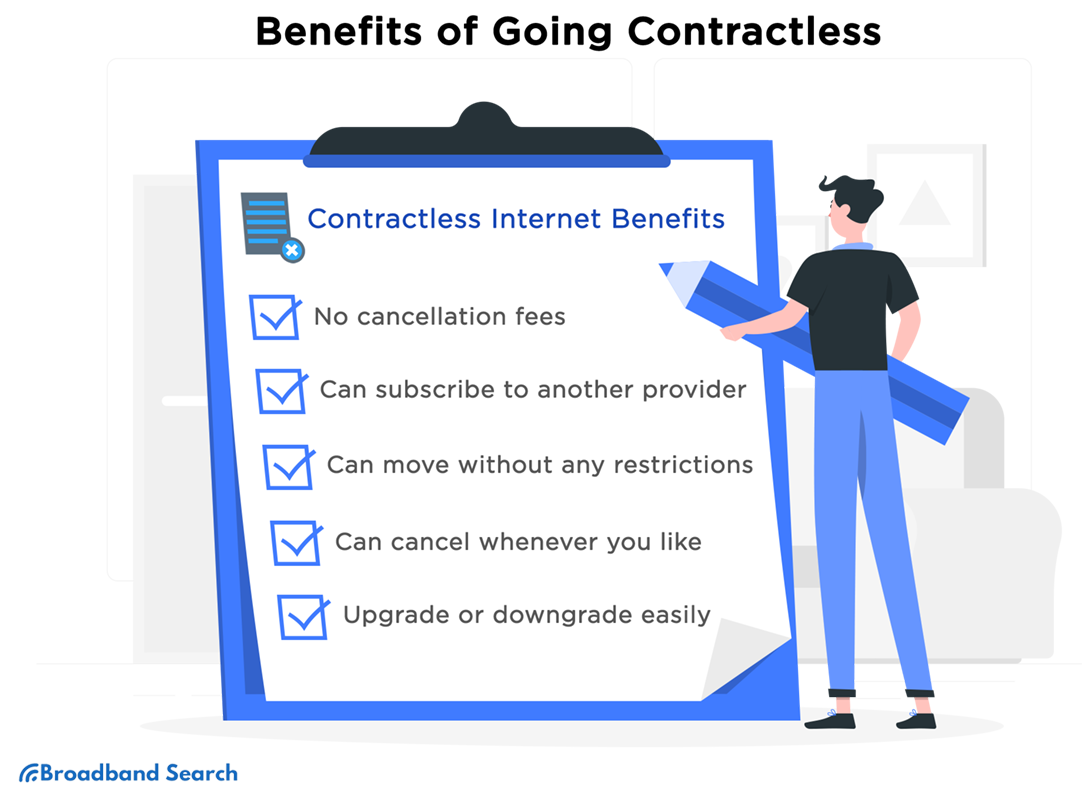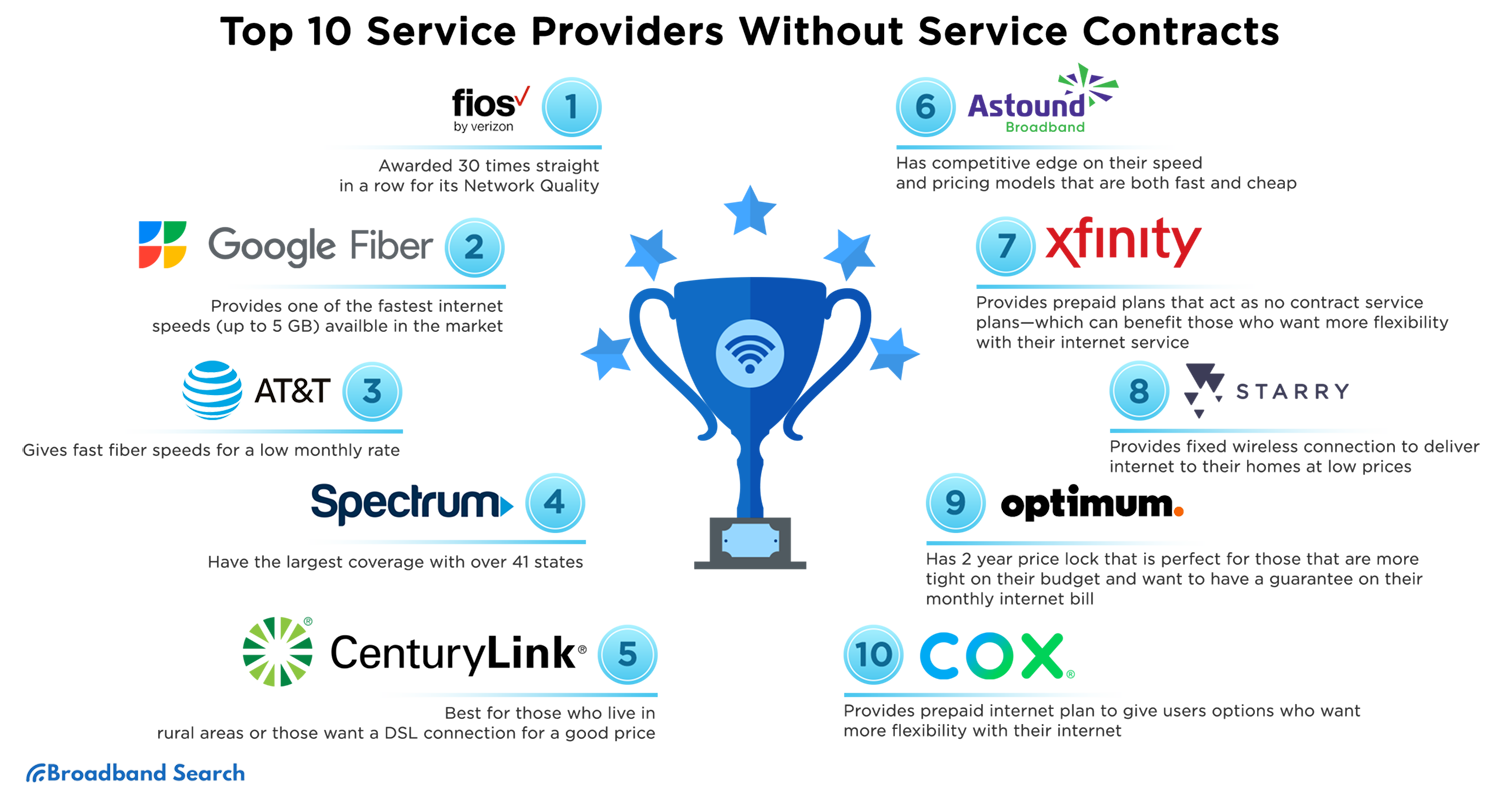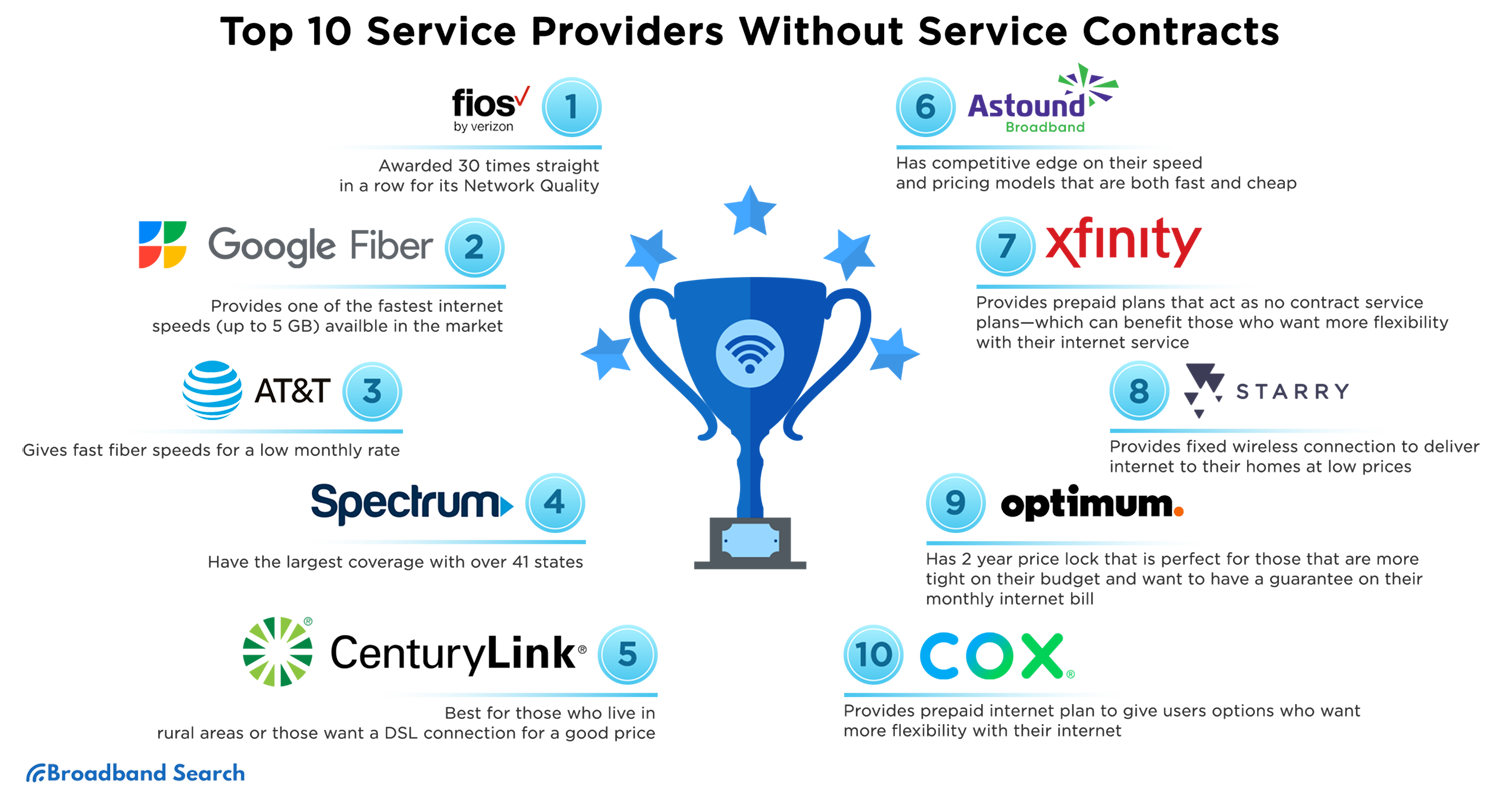Why Does No-Contract Internet Matter in 2025?
If there's one thing that most Americans can agree on, it's that internet service providers (ISPs) can be incredibly frustrating to deal with. In fact, according to the American Customer Satisfaction Index's Telecommmunications Study for 2024, ISPs continue to rank near the bottom when compared to the 40 other industries in the study. Many companies are now offering more flexible plans, like dropping early termination fees. If you value flexibility and freedom, contract-free plans are a great choice. This guide will help you find the top 10 ISPs without service contracts for 2025.
Key Takeaways
- Flexibility is Key: No-contract internet plans allow you to switch providers or cancel your service at any time without facing early termination fees, offering significant freedom.
- Top Providers Offer Variety: Leading ISPs like Verizon Fios, Google Fiber, and AT&T provide competitive no-contract options, though availability varies by location.
- Prepaid is an Option: Services like Xfinity Prepaid and Cox StraightUp offer pay-as-you-go internet, which is ideal for students, renters, or those needing temporary service.
- Trade-Offs Exist: While contract-free plans provide flexibility, they may come with higher monthly rates compared to long-term contract plans and promotional prices may increase after an initial period.

What Are the Benefits of Choosing a No-Contract Internet Provider?
These are the main benefits of going contractless:
- Flexibility — Without a contract, you can switch or cancel without penalty.
- Cost savings — There are no early termination fees or penalties when you choose a no-contract ISP.
- Short-term convenience — Ideal for renters, students, or frequent movers, contractless ISPs make it easy for those who want to avoid a long-term commitment.
- Trial potential — Without a contract in place, you can test service quality before committing long-term.
How Did We Choose the Top 10 Providers?
Wondering how we picked the top 10 ISPs without service contracts? These are the metrics we looked at:
- Coverage and availability.
- Internet speed performance.
- Customer satisfaction ratings.
- Transparent pricing and policies.
- Flexibility (true no-contract terms or prepaid options).

Which Are the Top 10 ISPs Without Contracts in 2025?
1. Verizon Fios Home Internet
Often taking the top spot on our list of one of the best no-contract ISPs, Verizon Fios Home Internet is a fiber network that offers strong reliability and superior connectivity. At this time, it is only available in select states, including Delaware, Maryland, Massachusetts, New Jersey, New York, Pennsylvania, Rhode Island, and Virginia. It is also available in Washington D.C.
What Are the Plans and Pricing?
All Verizon plans share common features such as unlimited 4G LTE data, talk, and text, as well as the flexibility of no contract obligations, allowing customers to cancel at any time without additional charges. A router is also included in all plans.
- 300 Mbps ($34.99/month) — Best for moderate data users.
- 500 Mbps ($59.99/month) — Best for those with multiple devices who need additional data.
- 1 Gig ($74.99/month) — Best for multi-user households who stream, work, or game at home.
- 2 Gig ($94.99/month) — Only available in select areas, best for high-volume users and multi-person households.
What Are the Pros?
- Reliable fiber speeds.
- Unlimited data.
- No contract.
What Are the Cons?
- Limited availability.
- Pricing is slightly higher than other ISPs.
2. Google Fiber
Famous for its blazing-fast fiber speeds, Google FIber is an easy choice for a no-contract ISP — if it's available in your area. With some plans available for up to 8 Gbps, it's clearly the front-runner if you spend a lot of time working from home, gaming with your friends, or streaming your favorite shows.
The only downside to Google Fiber is that it is still only available in select areas, though access is rapidly increasing. At this time, you may be able to hook up to Google Fiber if you live in certain cities in the following states: Alabama, Arizona, California, Colorado, Florida, Georgia, Idaho, Illinois, Iowa, Kansas, Missouri, Nebraska, Nevada, North Carolina, South Carolina, Tennessee, Texas, Utah, and Washington.
What Are the Plans and Pricing?
- Core ($70/month) — Google's original package offers 1 Gig of data per month, making it an excellent option for the average user.
- Home ($100/month) — Designed with multi-user households in mind, this 3 Gig plan is ideal if you have multiple people in the residence who work, game, and stream from home.
- Edge ($150/month) — Specifically created for game designers and content creators, this 8 Gig plan offers lightning-fast speeds.
What Are the Pros?
- Transparent pricing.
- Symmetrical speeds.
- Unlimited data.
What Are the Cons?
- Limited to certain cities.
- Fewer bundled options.
3. AT&T Fiber (and DSL options)
As one of the oldest providers of phone and internet service in the country, AT&T has long been known for its reliability and dependability. Its fiber internet is widely available, making it one of the most accessible no-contract ISPs, and users appreciate its consistently strong fiber performance.
What Are the Plans and Pricing?
The plans and pricing for AT&T Internet vary based on the area, with plans starting as low as $34.99 per month.
- AT&T Fiber — Delivering faster speeds than DSL or cable internet, this is AT&T's fastest option. It is available in select areas.
- AT&T Internet Air — The newest option from AT&T, this package relies on 5G internet to deliver fast speeds and quality service.
- AT&T Internet — Offering speeds of up to 100 Mbps, this is a valuable option for average users.
What Are the Pros?
- Multiple speed tiers.
- No data caps on fiber.
What Are the Cons?
- DSL still capped.
- Fiber not available everywhere.
4. Spectrum
As one of the largest ISPs in the U.S., Spectrum is able to offer wide coverage across the country, making it a viable option for many users looking for reliable and convenient internet access. Spectrum also has earned a reputation for offering versatile contract buyout options, which has increased the appeal among users who prize flexibility and freedom.
What Are the Plans and Pricing?
- Internet Advantage ($30/Month) — Offering speeds of up to 100 Mbps, this plan is perfect for moderate users looking for a budget-friendly option.
- Internet Premier ($50/Month) — With speeds reaching up to 500 Mbps, this plan works well for multi-member households with moderate users.
- Internet Gig ($70/Month) — For large households who are frequently streaming, gaming, or working from home, this 1 Gig plan is the most valuable option.
What Are the Pros?
- No hard data caps.
- Strong availability.
What Are the Cons?
- Prices increase after promotional period ends.
- Mixed customer service reviews.
5. CenturyLink (Lumen Technologies)
Boasting an extensive network that reaches at least 37 states, CenturyLink has become the most reliable ISP for those who may not have a lot of options available. Its rural reach is particularly desirable, and customers appreciate that this ISP offers a DSL and fiber mix.
What Are the Plans and Pricing?
- Simply Unlimited Internet ($55/Month) — With speeds up to 100 Mbps, this valuable plan works well for average users who work from home, stream movies, or shop online.
- Fiber Internet ($75/Month) — Boasting speeds up to 940 Mbps, this is an excellent plan for multi-user households who use the internet regularly. It's only available in select areas, though.
What Are the Pros?
- Unlimited data on Simply Unlimited.
- Fair pricing.
What Are the Cons?
- DSL speeds inconsistent.
- Fiber coverage limited.
6. Astound Broadband (RCN, Grande, Wave)
With a strong regional presence in select areas in the U.S., Astound Broadband is able to offer consistent and reliable service as well as competitive pricing. Astound Broadband is available in select regions in Washington, Oregon, California, Texas, Illinois, Indiana, New York, Massachusetts, Pennsylvania, Virginia, Maryland, and Washington D.C.
What Are the Plans and Pricing?
Pricing for Astound Broadband plans may vary based on the region.
- 300 Mbps ($30/Month) — This high-speed, no-contract plan is an affordable option for high-volume users.
- 600 Mbps ($45/Month) — Offering faster speeds, this plan works best for multi-user households that work, game, or stream regularly.
What Are the Pros?
- Low entry prices.
- Unlimited data.
What Are the Cons?
- Steep post-promotional price hikes.
- Limited availability.
7. Xfinity Prepaid Internet
As the largest U.S. provider with prepaid options for users who want to avoid a contract, Xfinity Prepaid Internet is an excellent choice if you need a pay-as-you-go option. Xfinity has a large coverage area that includes more than 40 states, primarily along the East Coast, in the South, and in the Midwest, making this an accessible alternative to standard ISP contract service.
What Are the Plans and Pricing?
- NOW Xfinity ($30/Month) — Plans for NOW Xfinity prepaid internet begin at $30 per month, allowing you to select the speed and prepaid pricing option that works for you. This plan is designed for those who need flexibility, such as people with summer homes or students who are living on campus.
What Are the Pros?
- Prepaid flexibility.
- Large coverage area.
What Are the Cons?
- Data caps on standard plans.
- Regional price variations.
8. Starry Internet
Offering fixed wireless service through the use of next-generation wireless technology, Starry Internet is a reliable and affordable option for no-contract service. The downside is that it's only available in select markets, including Boston, Denver, Los Angeles, New York, and Washington D.C.
What Are the Plans and Pricing?
- Starry 200 ($30/Month) — Offering speeds of up to 200 Mbps, this package works well for low-volume users who primarily stream or browse online.
- Starry 500 ($55/Month) — Considered to be the most popular plan, this option offers speeds of up to 500 Mbps and offers premier performance for multi-user households that work, game, or stream from home.
- Starry Gigabit ($75/Month) — With lightning-fast speeds of up to 1 Gig, this plan is preferred by high-volume households that have multiple devices connected at once.
What Are the Pros?
- Transparent pricing.
- No data caps.
- Free equipment.
What Are the Cons?
- Very limited availability.
- No bundle options.
9. Optimum
Known for its high customer satisfaction ratings, Optimum is one of the ISPs that consumers actually enjoy working with. Offering strong coverage in the Northeast with a variety of fiber and cable speeds, it's a top choice if you live in this area.
What Are the Plans and Pricing?
- 500 Mbps Fiber Internet ($60/Month) — This high-speed package works well for those working or completing schoolwork remotely. It supports multiple devices at once.
- 1 Gig Fiber Internet ($70/Month) — Known for its ultra-fast speeds, this package is perfect if you have a home with plenty of smart devices inside.
- 2 Gig Fiber Internet ($70/Month) — Designed for those who take the internet seriously, this package is best for game designers, content creators, and professionals who rely heavily on multiple devices in their daily lives.
What Are the Pros?
- No data caps.
- Multiple gig-speed options.
What Are the Cons?
- Customer satisfaction scores vary.
- Promo pricing increases.
10. Cox (StraightUp Prepaid Internet)
Over the years, Cox has become known as a reliable provider, with customers reporting minimal downtime and disruptions. The prepaid plans available through Cox offer greater flexibility and versatility, particularly for seasonal customers or those who move frequently.
What Are the Plans and Pricing?
- 300 Mbps ($50/Month) — This is an excellent and affordable plan for single-user households that browse the web or use social media frequently.
- 500 Mbps ($80/Month) — Offering faster speeds, this plan is popular among multi-user households that enjoy multi-player gaming or that have occupants who work from home.
- 1 Gig Internet ($110/Month) — This super-fast plan is preferred by high-volume users who have multiple devices connected at one time.
What Are the Pros?
- Prepaid option for flexibility.
- Wide availability.
What Are the Cons?
- Data caps on most plans.
- Upload speeds weaker than fiber competitors.
How Do the Top No-Contract ISPs Compare?
| Provider | Starting Price | Max Speed | Best For |
|---|---|---|---|
| Verizon Fios | $34.99/mo | 2 Gig | Fastest Speeds |
| Google Fiber | $70/mo | 8 Gig | Fastest Speeds |
| AT&T | $34.99/mo | 5 Gig | Nationwide Coverage |
| Spectrum | $30/mo | 1 Gig | Nationwide Coverage |
| CenturyLink | $55/mo | 940 Mbps | Rural Availability |
| Astound Broadband | $30/mo | 1.5 Gig | Budget-Friendly |
| Xfinity Prepaid | $30/mo | Varies | Prepaid Flexibility |
| Starry Internet | $30/mo | 1 Gig | Urban Flexibility |
| Optimum | $60/mo | 8 Gig | Urban Flexibility |
| Cox Prepaid | $50/mo | 1 Gig | Prepaid Flexibility |
What are the Pros & Cons of Going Contract-Free?
Before you make your final decision, here are the benefits and disadvantages of making the leap to contract-free internet:
What are the Pros?
- No cancellation fees.
- Flexibility for movers and renters.
- Easier to test providers.
- Transparent pricing in many cases.
What are the Cons?
- Higher monthly rates compared to contract plans.
- Limited availability of true no-contract options.
- Price hikes after promotional periods still apply.
FAQ
What does "no-contract" mean for an internet plan?
A no-contract internet plan means you are not locked into a service for a specific period. You can change or cancel your plan at any time without paying an early termination fee (ETF), which gives you maximum flexibility.
Are no-contract internet plans more expensive?
Often, the monthly rate for a no-contract plan can be slightly higher than the promotional rate offered for a 12 or 24-month contract. However, you save money by avoiding cancellation fees if you need to move or switch providers.
Can I keep my own equipment with a no-contract plan?
This depends on the provider. Some ISPs require you to use their equipment (which may be included or rented), while others allow you to use your own compatible modem and router. Always check the provider's policy before signing up.
What happens to the price after the promotional period ends?
Many no-contract plans still have promotional pricing for the first 12 months. After this period, your monthly rate will likely increase to the standard rate. It's important to be aware of what the price will be after the promotion ends.
Should You Go Contract-Free?
Choosing a contract-free ISP gives you the autonomy you need to choose the plan that is right for you without the long-term commitment of a restrictive contract, but you may not be eligible for the reduced pricing that is available through a contract. If you are prioritizing flexibility and short-term convenience, then going contract-free may be the best option. However, if you are searching for lower promotional rates and long-term bundle packages, then you may be better off with contract service.
Want to quickly discover the best ISP for you? Visit Broadband Search. Our internet provider search tool can help you compare prices, features, and plans from multiple ISPs in your area, ultimately simplifying your search and helping you quickly see the best available options.

